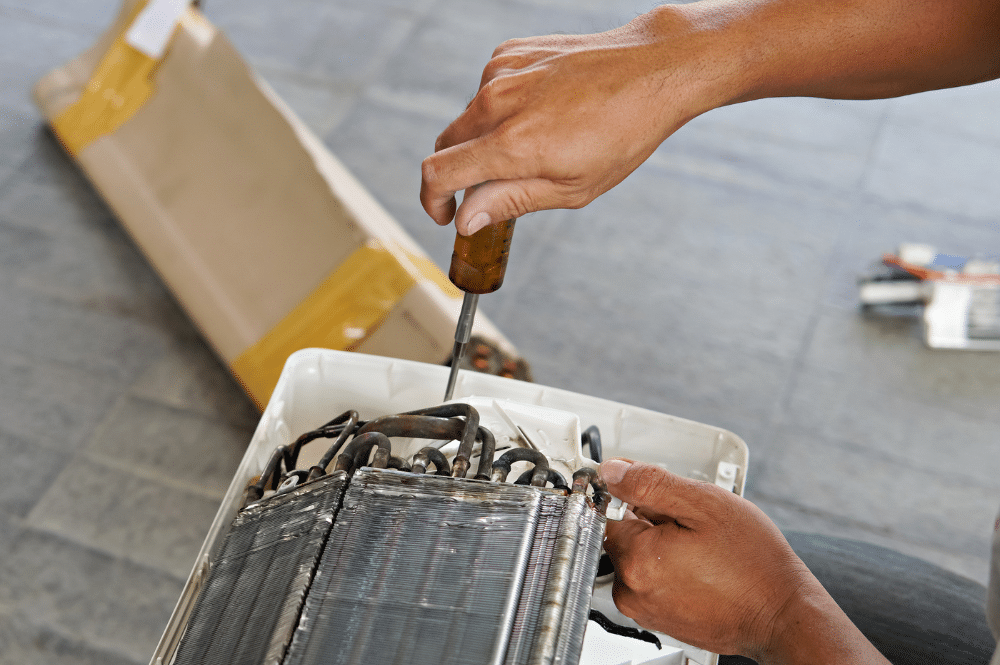If you own an AC unit, you’re likely aware of the importance of maintaining a clean condenser. A dirty condenser can lead to numerous issues, such as reduced efficiency and even complete system breakdown. That’s where AC condenser cleaners come into play. These specialized products are designed to keep your AC unit in top shape by effectively cleaning the condenser coils and eliminating dirt and debris buildup.
With a plethora of AC condenser cleaners available on the market, selecting the right one is crucial. Here are some things to look for:
User-Friendly: Opt for a cleaner that’s easy to use, and requires no specialized skills or knowledge.
Safety: Ensure the cleaner is safe to use and won’t harm the condenser coils.
Effectiveness: Look for a cleaner that can efficiently remove dirt and debris from the condenser coils.
AC condenser cleaners are a valuable tool for maintaining your AC unit’s performance. Choose a cleaner that is easy to use, safe, and effective, and you’ll be able to keep your AC unit running smoothly for years to come.
Understanding AC Condenser Cleaners
An AC condenser cleaner is a specialized product designed to clean the AC condenser coils. These coils, typically located outside the AC unit, can accumulate dirt, dust, and debris over time. AC condenser cleaners are specifically formulated to remove these contaminants, ensuring the coils can function their best. Failure to clean the coils can lead to decreased efficiency and potential AC system breakdown.
How to Use an AC Condenser Cleaner
Using an AC condenser cleaner is a straightforward process. First, locate the AC condenser coils, usually situated on the exterior of the AC unit. Once you’ve found them, apply the cleaner as instructed on the product label. After spraying the coils, allow the cleaner to sit for a few minutes, allowing it to penetrate and dislodge any dirt, dust, or debris. Following this dwell time, use a brush to gently scrub the coils, removing any remaining contaminants. Rinse the coils thoroughly with water and ensure they are completely dry before turning the AC unit back on.
It’s essential to follow the product’s instructions to ensure proper usage.
The Function of an AC Condenser
The AC condenser plays a pivotal role in cooling your AC unit, making it a cornerstone of the entire cooling process. Within the condenser, coils are filled with refrigerant, and as your AC system runs, these coils undergo a transformative process. The refrigerant inside the coils becomes frigid, causing the air around them to cool down significantly. This newly chilled air is then circulated through the AC unit and ultimately dispersed into your living space, creating a comfortable and refreshing atmosphere.
This intricate cooling dance is only possible when the condenser coils remain in pristine condition. The coils need to be clean and free from obstructions, such as dirt, dust, or debris, to perform at their best. When these coils are covered in contaminants, it’s akin to a stumbling block in the path of cool air production. In such cases, the condenser’s efficiency takes a hit, and your AC system may struggle to deliver the cooling relief you rely on. Therefore, keeping your condenser clean is not just a matter of maintenance but a fundamental requirement for your AC unit to function at peak performance and provide the comfort you expect.
How Often Should You Clean Your AC Condenser?
The frequency of AC condenser cleaning can vary based on several factors, including your local climate and your specific AC unit. In general, most AC condensers should be cleaned at least once a year. However, professional AC specialists may recommend more or less frequent cleaning based on your unique circumstances. Areas with high levels of airborne dust and debris may require more frequent cleaning to prevent clogs and performance issues. By adhering to local AC specialists’ guidance and conducting regular AC maintenance checks, you can ensure your AC unit stays in peak condition year-round.
AC Condenser vs. Compressor
While the AC condenser and compressor are both important components of an air conditioning system, they serve distinct functions. The AC condenser transfers heat from your AC system into the surrounding environment, while the compressor converts gas refrigerant into liquid refrigerant. Typically, a condenser has a longer lifespan than a compressor due to experiencing less wear and tear over time. While these components may appear similar, they fulfill different roles within your AC system. To maintain your entire AC system’s performance, it’s crucial to regularly clean your AC condenser with a specialized cleaner designed to address exterior surface buildup. Consistent cleaning and maintenance can extend the efficiency and longevity of your AC condenser.
Consequences of AC Condenser Failure
When an AC condenser fails, it can lead to various issues. Reduced cooling efficiency is an immediate concern, as a malfunctioning condenser allows warm air to enter the system. Without proper condenser operation, your AC unit may struggle to cool your living or working space effectively. Additionally, AC condenser failure can damage other system components, including the evaporator, fans, compressor, and coils. It’s crucial to promptly clean or replace your AC condenser if you detect any signs of malfunction.
Using an AC condenser cleaner is a proactive and cost-effective measure to guarantee that your AC condenser operates optimally. Regular cleaning with a specialized cleaner can extend the lifespan of your condenser and enhance the overall efficiency of your AC system. By preventing the accumulation of dirt and debris on the condenser coils, you’re not only ensuring that your AC system delivers consistent cooling performance but also saving yourself from potentially costly repairs down the road.
However, if you ever find yourself worried about AC condenser issues, it’s essential to reach out to experts who can provide guidance and solutions. Schneider Mechanical is your trusted partner in this regard. Our team of professionals possesses in-depth knowledge of AC systems and condenser maintenance. We offer expert advice on AC cleaning solutions tailored to your specific needs, ensuring your AC unit remains in excellent condition year-round.
In cases where you’ve diligently cleaned your condenser and are still experiencing functionality problems, it’s advisable to have a professional inspection. A thorough assessment by our experienced technicians can pinpoint any underlying issues that may require repair or replacement. By addressing these concerns promptly, you can restore your AC unit to its peak performance and ensure a comfortable, well-ventilated environment in your home or workplace. Schneider Mechanical is here to provide comprehensive solutions, ensuring your AC system remains reliable and efficient, no matter the season.


